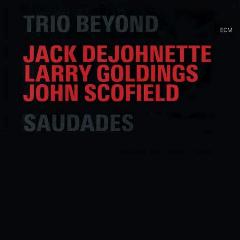Trio Beyond - Saudades (2006)
Trio Beyond - Saudades (2006)

CD1 1.If; 2.As One; 3.Allah Be Praised; 4.Saudades; 5.Pee Wee; 6.Spectrum. CD2: 7.Seven Steps to Heaven; 8.I Fall in Love Too Easily; 9.Love in the Blues; 10.Big Nick; 11.Emergency. Artists: Jack DeJohnette - drums Larry Goldings - Hammond organ, electric piano, sampler John Scofield – guitars
Trio Beyond is the name of the group that played at Queen Elizabeth's Hall in London, 2004. Jack DeJohnette initiated a project to pay tribute to the late Tony Williams' Lifetime -- with the late Larry Young on organ and guitarist John McLaughlin, all three were Miles alumni -- a band that, along with the Miles Davis band, spearheaded the jazz-rock fusion era. DeJohnette replaced Williams in the Davis group, and John Scofield is also a Miles alumnus; Larry Goldings had been approached by Williams in 1997 to put together an organ trio with a similar concept to Lifetime; Williams passed away shortly thereafter. The results on this double-disc album, Saudades, are explosive, dynamic, and utterly compelling. The repertoire comes from Lifetime's songbook. Spectrum: The Anthology and the intense stunner of a set closer "Emergency" come from the band's debut album of the same name, and two more pieces, Young's "Allah Be Praised" and John Coltrane's "Big Nick" come from Turn It Over, the second Lifetime disc. DeJohnette goes a step further here in featuring Davis' "Seven Steps to Heaven" in the program. The album the tune draws its title from is the first date Williams appeared on as a member of the trumpeter's group. Also included here is "I Fall in Love Too Easily," which was a staple of the Davis quintet at the time. "Pee Wee" is a Williams original scored for the quintet, while "If" is drawn from Young's classic Blue Note album Unity. Two of the remaining three tunes -- the title cut and the rocking "Love in Blues" -- were co-composed by Trio Beyond and Goldings; "As One" is the other. Musically, this is jazz first and rock second. The readings of both the Miles tunes and the Lifetime and Young material have been deepened by the mature experience of the players, but also nuanced by a deeper understanding of the era and its place in the jazz tradition -- and yes, fusion -- jazz-rock fusion has a certified place in the lineage. The set crackles with freshness and a sense of delight by the players. Goldings has never sounded looser, Scofield hasn't played this way since he played with Davis, and DeJohnette's sense of space and time, while deeply influenced by Williams, are his own. The moments on "If," which opens the album, are full of funky grooves by Goldings who simply juxtaposes his sense of bop phrasing, vanguard eclecticism, and the blues equally. The title cut is deep grooved and edgy, full of knots, twists, and turns. McLaughlin's "Spectrum" contains all the abstraction of the original and then some. Scofield uses his guitars as a sound device in addition to their intended purpose, and Goldings has never had a difficult time playing outside. Disc two kicks off with nearly 13 minutes of "Seven Steps to Heaven." The playing is attentive, finessed, and well rehearsed. The feeling that comes across is certainly different than the acoustic quintet's version but one that is reverent and full of its own sense of mode and harmonic interval development. "Love in Blues" rocks but is all to brief, clocking in at less than five minutes, and "Big Nick" contains within it the same, shifting bluesed-out sense of time that Lifetime's did. DeJohnette's sense of groove and ground are impeccable, ad the soloing all around is top-notch. This is one of the finer moments in recent ECM history, and a fitting tribute to Williams and his contribution to a music that sharply divided "purists' (who still are a pain in the ass in trying to preserve jazz as a museum piece), and those more progressive thinking fans who were -- and are still -- looking for a music that could breathe, engage the culture, and continue to grow. ---Thom Jurek, Rovi
download (mp3 @192 kbs):
yandex 4shared zalivalka cloudmailru
Last Updated (Tuesday, 02 June 2015 20:46)








